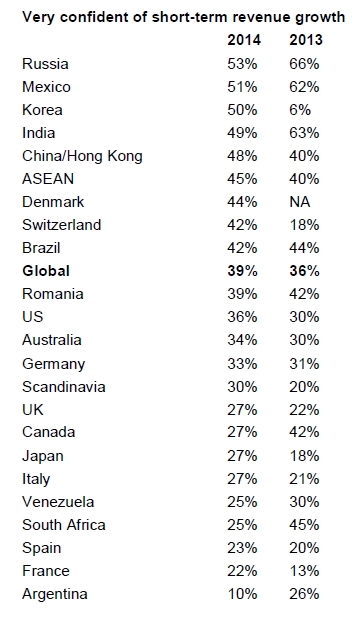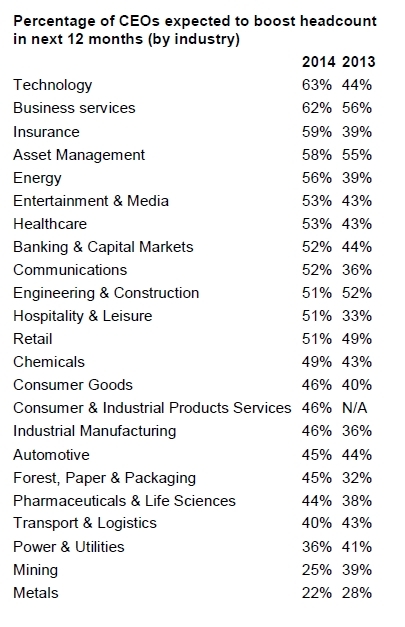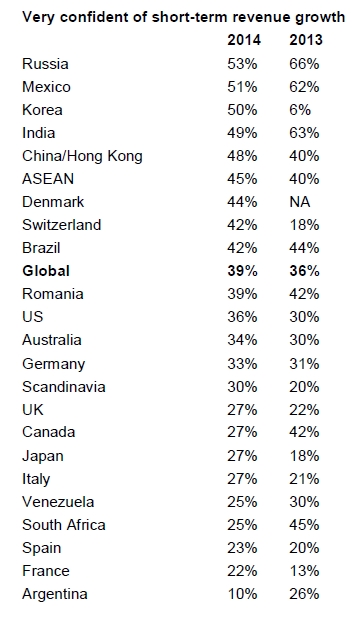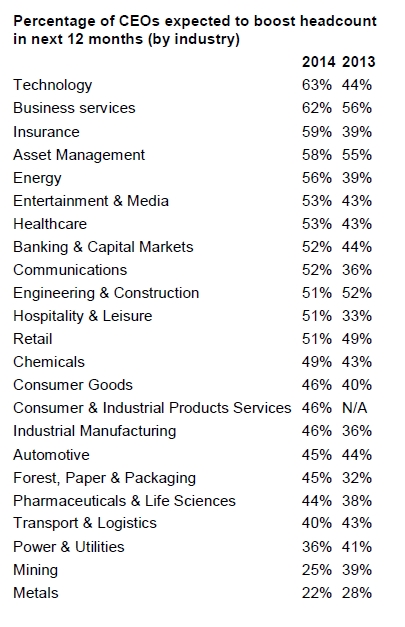Global economy
The number of CEOs who see improvement in the global economy over the next 12 months leapt to 44%, up from only 18% last year. And just 7% predict the global economy will decline, sharply down from 28% in 2013.
Regionally, CEOs in Western Europe are the most confident about short-term global economic prospects (50%), in line with signs of improving conditions. They are followed by those in the Middle East (49%), Asia Pacific (45%), Latin America (41%), North America (41%) and Africa (40%). CEOs in Central and Eastern Europe show the lowest level of confidence at 26%.
By industry, CEOs in the Hospitality and Leisure sector are most confident about prospects for the next 12 months (46%), followed by those in Banking and Capital Markets (45%), Retail (44%), Financial Services (44%), Asset Management (44%), Communications (44%), and Engineering & Construction (41%). CEOs in the Metals industry are least confident at 19%.
Revenue growth
For their own companies, 39% of CEOs say they are 'very confident' of revenue growth prospects for the next 12 months. That's up from 36% last year. Confidence in revenue growth reached a low of 21% in 2009.
CEOs in the Middle East, 69%, are the most confident of short term revenue growth, up from 53% last year. They are followed by those in Asia Pacific at 45%, up from 36% last year.
In Western Europe, confidence has risen 8% from last year's trough to reach 30%. But in Africa confidence has continued to fall. Just 40% of African CEOs are very confident of 12-month growth, down from 44% last year and 57% in 2012. Confidence has also dipped among Latin American CEOs, to 43%, down from 53% last year. Meanwhile, CEO confidence in North America remains flat at 33%.
At an individual country level, confidence varies very widely: the highest levels of CEO confidence are found in Russia, where 53% of CEOs are very confident of revenue growth, followed by Mexico (51%) and Korea 50%. Korea has had a huge swing in confidence up from only 6% last year. They are followed by India (49%), China (48%), Switzerland (42%), Brazil (42%), US (36%), Germany (33%), UK (27%), Canada (27%), Japan (27%), Italy (27%), France (22%) and, finally Argentina where only 10% of CEOs are very confident of revenue growth in 2014. (see note 2)
Commenting on the survey results, released at the opening of the World Economic Forum's annual meeting in Davos, Switzerland, Dennis M. Nally, Chairman of PricewaterhouseCoopers International, said:
"CEOs have begun to regain confidence. They've successfully guided their companies through recession and now more CEOs feel positive about their ability to increase their revenues and prospects for the global economy. However, CEOs also acknowledge that generating sustained growth in the post-crisis economy remains a challenge, especially as they deal with changing conditions like slowing growth in the emerging markets.
"And worries continue to loom large on CEO horizons with CEOs sending a clear message to government with their levels of concerns about over-regulation, fiscal deficits and tax burdens at their highest levels.
"For the future, CEOs tell us that they expect three major global trends - rapid technological advances, demographic changes and shifts in economic power - will have a major impact on the future of their businesses. Finding ways of turning these global trends to their advantage will be the key to future success."
CEO top concerns
As CEOs' viewpoint on the economy slants upward, their major concerns have also changed. Government action, or the lack of it, tops the list of CEO worries. The level of concern about over-regulation at 72% and fiscal deficits at 71% are as high as they have ever been. Countries where CEOs are particularly worried about over regulation include France 88%, Australia 85%, India 82% and Germany 77%. In the US it is fiscal deficits that have CEOs most worried with 92% CEOs expressing concern, followed by Argentina at 90% and France at 84%.
In addition, CEOs say they are worried almost as much about a slowdown in emerging economies, 65%, as they are about sluggish growth in developed markets, 71%. Other top concerns include increasing tax burdens (70%), as well as availability of key skills (63%), exchange rate volatility (60%) and lack of stability in capital markets (59%).
But such topical subjects as cyber threats - including lack of data security - and the speed of disruptive technological change are named as threats by less than half of CEOs.
Talking in more detail about regulation, nearly 80% of CEOs say it has increased costs, while 52% say that regulation makes it more difficult to attract skilled workers. And 40% say regulation has inhibited their efforts to pursue a new market opportunity or to pursue innovation. On the positive side, over half of CEOs credit regulation for helping to improve service delivery and quality standards.
Preparing for the future
When asked what would drive future growth, new product or service development leads the list of opportunities, cited by 35% of CEOs compared with 25% last year. Those planning mergers and acquisitions or strategic alliances in the next year have risen to 20%, up from 17% a year ago. CEOs also say they are exploring growth in countries beyond the BRICs (Brazil, Russia, India and China), and see good growth prospects over the next three to five years in Indonesia, Mexico, Turkey, Thailand and Vietnam. The US, Germany and the UK are also ranked highly.
CEOs are also more positive about hiring plans for the coming year. Half of CEOs say they expect to add to staff in the next 12 months, compared with 45% who had such plans last year. Industries where job prospects look most positive are technology (63%), business services (62%) and asset management (58%) (see note 3).
As the global economy stabilises, CEOs have identified major trends that will transform their business over the next five years. Top among them is technological advance, cited by 81% of CEOs, followed by demographic shifts, 60%, and shifts in global economic power, 59%.
To meet these and other challenges, CEOs say they are making changes to their talent strategies (93%), customer growth and retention strategies (91%), technology investments (90%), organisational structure/design (89%) and use and management of data (88%).
More than half of CEOs say their current planning time horizon is three years, though only 40% say that time frame is ideal.
Dealing with Governments
Asked to rank the top priorities for government, CEOs say they should be to ensure financial stability, (53%) improve infrastructure (50%); and help to create a more internationally competitive and efficient tax system (50%). But less than half (46%) of CEOs say the government in their home country has effectively ensured financial stability, and just 37% give high marks for improved infrastructure. More than half (51%) of CEOs say their government has been ineffective in improving the tax system.
Paying Taxes
The international tax system has fallen short in the eyes of CEOs around the world, the survey finds. Nearly two-thirds of CEOs say the international tax system is in need of overhaul. Notably, 75% of CEOs say that being seen as paying a 'fair share' of tax is important to their company.
Most CEOs say tax policies and competitiveness of tax regimes are key factors in corporate decision making, and agree that multinational companies should be required to report revenues, profits and taxes paid for each country in which they operate. They also agree tax authorities around the world should freely share information about companies.
But only a quarter of CEOs say current OECD attempts to reform the international tax system will be successful in the next few years, while 40% say efforts will not reach consensus.
Stakeholder expectations and trust
CEOs worldwide report that stakeholder expectations in their industry have changed significantly in the past five years: 52% say the level of trust among customers and clients has increased, compared with 12% who say it has declined. While 43% say trust has improved among creditors and investors, 16% say it has declined. Finally, 42% say trust among suppliers has improved, while only 6% say it has fallen.
But while 24% of CEOs have seen improved trust among government and regulators, 34% say it has declined.
The great majority of CEOs say it is important for companies to address stakeholders' expectations by promoting ethical behaviour, ensuring the integrity of supply chains and improving diversity.
1. Survey Methodology:
For PwC's 17th Annual Global CEO Survey, 1,344 interviews were conducted in 68 countries during the last quarter of 2013. By region, 445 interviews were conducted in Asia Pacific, 442 in Europe, 212 in North America, 165 in Latin America, 45 in Africa and 35 in the Middle East.
The full survey report with supporting graphics and broadcast quality footage can be downloaded at press.pwc.com. Video clips from the CEO survey press launch in Davos will also be available after the event.
2. List of country/regional CEOs saying they are very confident of 12 month growth:
The number of CEOs who see improvement in the global economy over the next 12 months leapt to 44%, up from only 18% last year. And just 7% predict the global economy will decline, sharply down from 28% in 2013.
Regionally, CEOs in Western Europe are the most confident about short-term global economic prospects (50%), in line with signs of improving conditions. They are followed by those in the Middle East (49%), Asia Pacific (45%), Latin America (41%), North America (41%) and Africa (40%). CEOs in Central and Eastern Europe show the lowest level of confidence at 26%.
By industry, CEOs in the Hospitality and Leisure sector are most confident about prospects for the next 12 months (46%), followed by those in Banking and Capital Markets (45%), Retail (44%), Financial Services (44%), Asset Management (44%), Communications (44%), and Engineering & Construction (41%). CEOs in the Metals industry are least confident at 19%.
Revenue growth
For their own companies, 39% of CEOs say they are 'very confident' of revenue growth prospects for the next 12 months. That's up from 36% last year. Confidence in revenue growth reached a low of 21% in 2009.
CEOs in the Middle East, 69%, are the most confident of short term revenue growth, up from 53% last year. They are followed by those in Asia Pacific at 45%, up from 36% last year.
In Western Europe, confidence has risen 8% from last year's trough to reach 30%. But in Africa confidence has continued to fall. Just 40% of African CEOs are very confident of 12-month growth, down from 44% last year and 57% in 2012. Confidence has also dipped among Latin American CEOs, to 43%, down from 53% last year. Meanwhile, CEO confidence in North America remains flat at 33%.
At an individual country level, confidence varies very widely: the highest levels of CEO confidence are found in Russia, where 53% of CEOs are very confident of revenue growth, followed by Mexico (51%) and Korea 50%. Korea has had a huge swing in confidence up from only 6% last year. They are followed by India (49%), China (48%), Switzerland (42%), Brazil (42%), US (36%), Germany (33%), UK (27%), Canada (27%), Japan (27%), Italy (27%), France (22%) and, finally Argentina where only 10% of CEOs are very confident of revenue growth in 2014. (see note 2)
Commenting on the survey results, released at the opening of the World Economic Forum's annual meeting in Davos, Switzerland, Dennis M. Nally, Chairman of PricewaterhouseCoopers International, said:
"CEOs have begun to regain confidence. They've successfully guided their companies through recession and now more CEOs feel positive about their ability to increase their revenues and prospects for the global economy. However, CEOs also acknowledge that generating sustained growth in the post-crisis economy remains a challenge, especially as they deal with changing conditions like slowing growth in the emerging markets.
"And worries continue to loom large on CEO horizons with CEOs sending a clear message to government with their levels of concerns about over-regulation, fiscal deficits and tax burdens at their highest levels.
"For the future, CEOs tell us that they expect three major global trends - rapid technological advances, demographic changes and shifts in economic power - will have a major impact on the future of their businesses. Finding ways of turning these global trends to their advantage will be the key to future success."
CEO top concerns
As CEOs' viewpoint on the economy slants upward, their major concerns have also changed. Government action, or the lack of it, tops the list of CEO worries. The level of concern about over-regulation at 72% and fiscal deficits at 71% are as high as they have ever been. Countries where CEOs are particularly worried about over regulation include France 88%, Australia 85%, India 82% and Germany 77%. In the US it is fiscal deficits that have CEOs most worried with 92% CEOs expressing concern, followed by Argentina at 90% and France at 84%.
In addition, CEOs say they are worried almost as much about a slowdown in emerging economies, 65%, as they are about sluggish growth in developed markets, 71%. Other top concerns include increasing tax burdens (70%), as well as availability of key skills (63%), exchange rate volatility (60%) and lack of stability in capital markets (59%).
But such topical subjects as cyber threats - including lack of data security - and the speed of disruptive technological change are named as threats by less than half of CEOs.
Talking in more detail about regulation, nearly 80% of CEOs say it has increased costs, while 52% say that regulation makes it more difficult to attract skilled workers. And 40% say regulation has inhibited their efforts to pursue a new market opportunity or to pursue innovation. On the positive side, over half of CEOs credit regulation for helping to improve service delivery and quality standards.
Preparing for the future
When asked what would drive future growth, new product or service development leads the list of opportunities, cited by 35% of CEOs compared with 25% last year. Those planning mergers and acquisitions or strategic alliances in the next year have risen to 20%, up from 17% a year ago. CEOs also say they are exploring growth in countries beyond the BRICs (Brazil, Russia, India and China), and see good growth prospects over the next three to five years in Indonesia, Mexico, Turkey, Thailand and Vietnam. The US, Germany and the UK are also ranked highly.
CEOs are also more positive about hiring plans for the coming year. Half of CEOs say they expect to add to staff in the next 12 months, compared with 45% who had such plans last year. Industries where job prospects look most positive are technology (63%), business services (62%) and asset management (58%) (see note 3).
As the global economy stabilises, CEOs have identified major trends that will transform their business over the next five years. Top among them is technological advance, cited by 81% of CEOs, followed by demographic shifts, 60%, and shifts in global economic power, 59%.
To meet these and other challenges, CEOs say they are making changes to their talent strategies (93%), customer growth and retention strategies (91%), technology investments (90%), organisational structure/design (89%) and use and management of data (88%).
More than half of CEOs say their current planning time horizon is three years, though only 40% say that time frame is ideal.
Dealing with Governments
Asked to rank the top priorities for government, CEOs say they should be to ensure financial stability, (53%) improve infrastructure (50%); and help to create a more internationally competitive and efficient tax system (50%). But less than half (46%) of CEOs say the government in their home country has effectively ensured financial stability, and just 37% give high marks for improved infrastructure. More than half (51%) of CEOs say their government has been ineffective in improving the tax system.
Paying Taxes
The international tax system has fallen short in the eyes of CEOs around the world, the survey finds. Nearly two-thirds of CEOs say the international tax system is in need of overhaul. Notably, 75% of CEOs say that being seen as paying a 'fair share' of tax is important to their company.
Most CEOs say tax policies and competitiveness of tax regimes are key factors in corporate decision making, and agree that multinational companies should be required to report revenues, profits and taxes paid for each country in which they operate. They also agree tax authorities around the world should freely share information about companies.
But only a quarter of CEOs say current OECD attempts to reform the international tax system will be successful in the next few years, while 40% say efforts will not reach consensus.
Stakeholder expectations and trust
CEOs worldwide report that stakeholder expectations in their industry have changed significantly in the past five years: 52% say the level of trust among customers and clients has increased, compared with 12% who say it has declined. While 43% say trust has improved among creditors and investors, 16% say it has declined. Finally, 42% say trust among suppliers has improved, while only 6% say it has fallen.
But while 24% of CEOs have seen improved trust among government and regulators, 34% say it has declined.
The great majority of CEOs say it is important for companies to address stakeholders' expectations by promoting ethical behaviour, ensuring the integrity of supply chains and improving diversity.
1. Survey Methodology:
For PwC's 17th Annual Global CEO Survey, 1,344 interviews were conducted in 68 countries during the last quarter of 2013. By region, 445 interviews were conducted in Asia Pacific, 442 in Europe, 212 in North America, 165 in Latin America, 45 in Africa and 35 in the Middle East.
The full survey report with supporting graphics and broadcast quality footage can be downloaded at press.pwc.com. Video clips from the CEO survey press launch in Davos will also be available after the event.
2. List of country/regional CEOs saying they are very confident of 12 month growth:

3. List of CEOs planning job increases by industry:

4. PwC helps organisations and individuals create the value they're looking for. We're a network of firms in 157 countries with over 184,000 people who are committed to delivering quality in assurance, tax and advisory services. Tell us what matters to you and find out more by visiting us at .pwc.com.
Recevez chaque matin par mail la newsletter Finyear, une sélection quotidienne des meilleures infos et expertises de la finance d’entreprise.
Lien direct : www.finyear.com/newsletter
Lisez chaque mois notre magazine digital sur www.finyear.com/magazine
Lien direct : www.finyear.com/newsletter
Lisez chaque mois notre magazine digital sur www.finyear.com/magazine
Autres articles
-
Hong Kong : bientôt des premiers ETF Bitcoin ?
-
TMS Network (TMSN) Powers Up As Cryptocurrency Domain Appears Unstoppable. What Does This Mean For Dogecoin (DOGE) and Solana (SOL)?
-
The Growing Popularity of Crypto Payments: Could TMS Network (TMSN), Alchemy Pay (ACH), and Ripple (XRP) Lead The Way Despite The Whales?
-
DigiFT DEX Raises $10.5M in Pre-Series A Funding Led by Shanda Group
-
Giddy Wallet Announces First-Ever Autogas Feature for Polygon
















